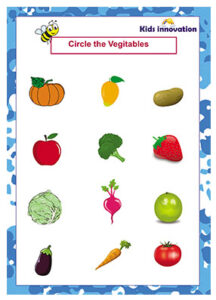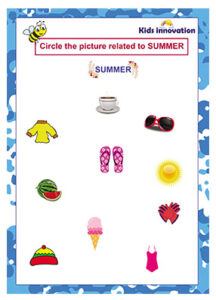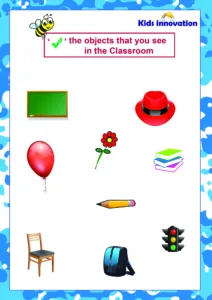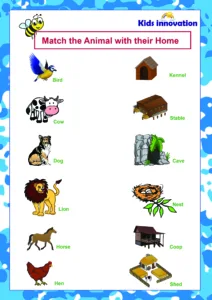kindergarten science worksheets

Introduction:
Kindergarten is a crucial stage in a child’s educational journey, serving as the foundation for their future academic success. While many aspects of kindergarten education are important, science plays a pivotal role in fostering a child’s curiosity, critical thinking, and problem-solving skills. Kindergarten science worksheets practice is an essential tool that helps young learners explore the world around them in a structured and engaging manner. In this article, we will delve into the significance of science worksheets in kindergarten education, the benefits they offer, and why they remain relevant even in the ever-evolving landscape of early childhood education.
The Importance of Kindergarten Education:
Kindergarten is often a child’s first formal introduction to the educational system. It serves as a bridge between early childhood experiences and more structured learning environments. The kindergarten years are a period of rapid cognitive and emotional development, making it a critical phase for nurturing a child’s inquisitiveness and love for learning. In this context, science plays a vital role as it encourages exploration and inquiry.

The Role of Science in Kindergarten Education:
Fostering Curiosity:
Science sparks a child’s natural curiosity about the world. It encourages them to ask questions, make observations, and seek answers. Through age-appropriate science activities, young learners can explore various phenomena and develop a deep sense of wonder about the universe.
Promoting Critical Thinking:
Science activities and worksheets in kindergarten teach children to think critically and logically. They learn to make hypotheses, conduct simple experiments, and draw conclusions. These skills are not only essential for science but also for problem-solving in various aspects of life.
Enhancing Vocabulary and Communication Skills:
Engaging in science activities and completing related worksheets allows children to build their vocabulary and improve their communication skills. They learn to describe what they see, hear, and think, which is essential for effective expression.

Instilling a Growth Mindset:
Science education in kindergarten helps foster a growth mindset, where children come to understand that intelligence and abilities can be developed through effort and learning. This mindset encourages resilience and a willingness to take on challenges.
Bridging Concepts Across Subjects:
Science education doesn’t exist in isolation. It often overlaps with other subjects such as mathematics, language arts, and even social studies. Kindergarten science activities and worksheets can help children make connections between these subjects, providing a holistic view of the world.
free kindergarten tracing & painting worksheets
The Significance of Science Worksheets in Kindergarten:
Science worksheets are an integral part of science education in kindergarten. They offer several advantages that contribute to a child’s overall development:

Structured Learning:
Worksheets provide a structured format for presenting scientific concepts to young learners. They offer a clear path for teaching and learning, ensuring that essential topics are covered systematically.
Hands-On Engagement:
Kindergarten worksheets often include hands-on activities, such as coloring, matching, and simple experiments. These activities make learning fun and interactive, allowing children to grasp concepts through direct experience.
Visual Learning:
Many children are visual learners, and worksheets often incorporate images, diagrams, and illustrations that help convey scientific concepts more effectively.

Reinforcement of Concepts:
Worksheets are excellent tools for reinforcing what children have learned. They can practice what they’ve been taught and apply their knowledge, helping to solidify their understanding.
Self-Paced Learning:
Science worksheets can be completed at a child’s own pace. This flexibility is particularly useful for children with varying learning styles and abilities, ensuring that no one is left behind.
Assessment and Progress Tracking:
Teachers and parents can use worksheets to assess a child’s understanding of scientific concepts. This assessment helps tailor further instruction to the child’s specific needs and monitor their progress.
Living and Non-Living Things:
Living things are organisms that possess characteristics such as growth, reproduction, response to stimuli, and metabolism. They are made up of cells and have a life cycle. Examples include plants, animals, and humans.
Non-living things, on the other hand, lack the characteristics of living organisms. They do not grow, reproduce, or have a metabolism. Non-living things can include objects like rocks, water, and air, as well as human-made items such as chairs and cars.
Understanding the distinction between living and non-living things is fundamental in teaching children about the diversity of the world around them. It lays the foundation for broader concepts in biology and ecology.
The Benefits of Kindergarten Science Worksheet Practice:
Cognitive Development:
Science worksheets aid in the cognitive development of young children. They encourage critical thinking, problem-solving, and abstract reasoning, all of which are foundational skills for academic success.

Vocabulary Expansion:
Completing science worksheets introduces children to new words and terminology. This expansion of their vocabulary not only benefits their science knowledge but also supports language development.
Exploration and Discovery:
Science worksheets provide a structured framework for exploring and discovering the world. Through hands-on activities and observations, children learn about various scientific principles and natural phenomena.
Emotional and Social Growth:
In kindergarten, children begin to develop emotional and social skills. Science activities, often done collaboratively, promote teamwork, sharing, and empathy. These activities also help children manage their emotions and build self-confidence.
Preparation for Future Learning:
Kindergarten science lays the groundwork for more advanced scientific concepts in later grades. A strong foundation in the early years can lead to greater success in science education throughout a child’s academic journey.

The Evolution of Kindergarten Science Education:
Kindergarten science education has evolved over the years, reflecting changes in educational philosophy, curriculum development, and technology. However, despite these changes, the core principles of hands-on exploration, critical thinking, and fostering curiosity remain constant.
Incorporating Technology:
In the modern era, technology has become an integral part of education. Science worksheets have adapted to include digital resources, interactive simulations, and online platforms that engage children and align with their digital experiences.
Emphasis on Environmental Awareness:
Contemporary kindergarten science education often places a significant emphasis on environmental awareness and sustainability. Children are introduced to ecological concepts, climate change, and the importance of protecting the environment.
Cross-Curricular Integration:
Educational research has shown that learning is most effective when it’s integrated across subjects. Kindergarten science activities increasingly incorporate elements of mathematics, language arts, and social studies, fostering a holistic understanding of the world.
Culturally Inclusive Curriculum:
Recognizing the diverse backgrounds of students, contemporary kindergarten science education endeavors to be culturally inclusive. This includes incorporating culturally relevant examples, stories, and scientific practices from various cultures.
Overcoming Challenges in Kindergarten Science Education:
While kindergarten science worksheets are invaluable, there are challenges that educators and parents must address to ensure the effectiveness of early science education.

Teacher Training:
Teachers require training and professional development to effectively implement science education in kindergarten. This includes understanding age-appropriate pedagogy and utilizing the right resources.
Resources and Funding:
Access to quality science resources, including materials for hands-on experiments, can be limited due to budget constraints in many schools. Securing funding for science education is essential to providing a rich learning experience.
Parental Involvement:
Parental involvement in a child’s education is crucial. Parents need to be aware of the importance of science education and actively engage in their child’s learning, both in and out of the classroom.

Addressing Educational Disparities:
Disparities in educational opportunities exist in many regions. Ensuring that all children, regardless of their socioeconomic background, have access to high-quality kindergarten science education is a challenge that needs attention.
free kindergarten tracing & painting worksheets
Conclusion:
Science worksheets practice remains a crucial component of early childhood education. Science education at this stage nurtures curiosity, critical thinking, and problem-solving skills, setting a strong foundation for future learning. While the landscape of kindergarten science education has evolved, the core principles of fostering exploration, discovery, and inquiry remain as important as ever. To ensure the continued success of kindergarten science education, it is essential for educators, parents, and policymakers to collaborate and address the challenges that may hinder its effectiveness. By doing so, we can provide our youngest learners with the
Some Multiple Choice Questions with Answers in Kindergarten Science Worksheet

Which animal can swim in water and quack?
a) Elephant
b) Duck
c) Lion
What do bees make that is sweet and gooey?
a) Milk
b) Honey
c) Juice
What do you call the baby of a cat?
a) Puppy
b) Kitten
c) Cub

What do we call the white, fluffy stuff that falls from the sky in winter?
a) Rain
b) Snow
c) Hail
What do plants need to grow?
a) Candy
b) Water
c) Toys
Which season is known for flowers and warm weather?
a) Winter
b) Spring
c) Autumn

What is the name of the giant, bright ball in the sky that comes out during the day?
a) Star
b) Moon
c) Sun
What is the name of the planet we live on?
a) Mars
b) Earth
c) Jupiter
Which of the following is a big, orange vegetable that grows underground?
a) Carrot
b) Banana
c) Apple
Which of the following is a cold and icy place with penguins?
a) Desert
b) Beach
c) Antarctica
To get more Kindergarten Science Worksheets from Shutterstock click here
https://www.shutterstock.com/search/science-worksheets-for-kindergarten
 Skip to content
Skip to content 
1 thought on “kindergarten science worksheets”